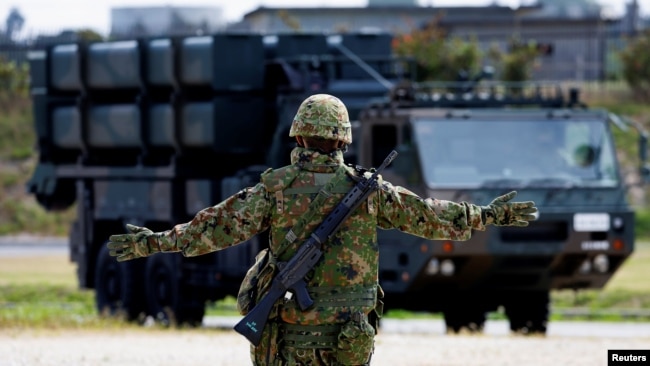VOAが伝える日本の防衛費増額計画
現在の日本の憲法はAmerican influence,では無いですよね!明らかに!!
そして、何もしてこなかったとさえ思われる貧弱な防衛体制。
とは言え、これで第3位になるとは驚きです。
世界地図を逆さにして、危険な周辺国との日本の位置関係を知ってほしいものです!!
アメリカ政府系ニュースサイトであるVOAが伝える日本の防衛費増額計画、海外からの視点を聴いて行きましょう!!
日本、新たな防衛費計画を発表(和訳)
Japan Announces New Defense Spending Plan
December 28, 2022
新しい国家安全保障戦略(NSS)等の下で、日本は防衛費をほぼ倍増し、ミサイルを新しい方法で配備することになります。
第二次世界大戦後、日本の軍隊は自衛隊と呼ばれ、攻撃的な兵器ではなく、防衛的な兵器を保有してきました。
近年、東南アジアで中国の影響力が強まっていることもあり、日本はその立場を見直しつつあります。
新しい防衛費計画のもとで、日本は他国の軍事目標を攻撃できるミサイルの購入を目指しています。
この支出は、世界第3位の経済大国が武器や防衛に費やす額が第9位でなくなることを意味します。
新しい計画では、今後5年間で日本の支出を国内総生産(GDP)の1%から2%へと引き上げ。ます。これが実現すれば、日本は防衛費で世界第3位に浮上することになります。
日本は初期の支出を、”反撃能力”、つまり他国の標的を攻撃する能力に集中させる予定です。
この動きは、日本の過去のガイドラインが攻撃的な武器を制限していたため、日本国内で議論の対象となりました。日本の憲法は、第二次世界大戦後にアメリカの影響を受けて制定されたもので、戦争をすることを禁じています。
NSSの新しい防衛構想では、外国の標的を攻撃できるミサイルを持つことが防衛の一形態として機能することに言及しています。しかし、新文書は先制攻撃は”依然として許されない”と述べています。
日本は、最大25,000キロの距離を飛ぶことができる米国製トマホークミサイルを数百発購入するでしょう。
新しい防衛計画は、日本がこの地域の安全保障状況は第二次世界大戦後”最も厳しく、複雑”であると考えていることから策定されました。
日本は、中国と北朝鮮による最近の軍事演習を懸念しています。さらに日本は、ロシアが中国との結びつきを強めていることを懸念しているといいます。
軍事専門家は、日本の指導者たちは、ロシアによる2022年のウクライナ侵攻が、他の国々に模範を示すかもしれないと懸念していると言っています。
日本での世論調査では、日本の新しい軍事計画への支持が示されています。
ジェイク・サリバン氏は米国大統領の国家安全保障アドバイザーです。彼は日本の新計画を "大胆である "と呼んでいます。
しかし、中国、北朝鮮、ロシアの指導者たちは、この計画を非難しました。中国は、日本は中国の脅威に対して過剰に反応し、軍事的な購入の理由付けをしていると述べています。ロシアは、この計画は無制限の "軍国主義化 "だと批判しています。
ジェームズ・ブラウン氏は東京にあるテンプル大学の教授です。彼は政治学の専門家です。ブラウン氏は、この批判を”without foundation”、つまり、事実に基づいていない、と呼んでいます。
彼は、ロシア、北朝鮮、中国が多くの長距離ミサイルを保有していることを指摘しています。
Japan Announces New Defense Spending Plan
Under a new National Security Strategy (NSS) and other documents, Japan will nearly double its defense spending and deploy missiles in a new way.
Since the end of World War II, Japan’s military, called the Japan Self-Defense Forces, has held defensive, not offensive weapons.
In recent years, partly because of the growing influence of China in Southeast Asia, Japan has been reconsidering its position.
Under a new defense spending plan, Japan aims to purchase missiles that can hit military targets in other countries.
The spending means the world’s third-largest economy will no longer spend the ninth-most on weapons and defense.
The new plan will increase Japan’s spending from one percent of its gross domestic product (GDP) to two percent over the next five years. If this happens, Japan will move to third in the world in defense spending.
Japan will center its early spending on what it calls “counterstrike capability,” or the ability to hit targets in other countries.
The move has been the subject of debate within in Japan, as the country’s past guidelines restricted offensive weapons. Japan’s constitution, written after World War II with American influence, bars it from making war.
The new defense ideas in the NSS note that having missiles that can hit foreign targets acts as a form of defense. But the new documents say striking first “remains impermissible.”
Japan’s military says it will purchase hundreds of U.S.-made Tomahawk missiles, which can travel up to 2,500 kilometers.
The new defense plan was developed because Japan believes that the security situation in the region is at its “most severe and complex” since the end of World War II.
Japan is worried about recent military exercises by China and North Korea. In addition, Japan said it is concerned about Russia’s growing ties with China.
Military experts say Japan’s leaders are concerned that Russia’s 2022 invasion of Ukraine may set an example for other nations to follow.
Public opinion studies in Japan have shown support for the nation’s new military plan.
Jake Sullivan is the National Security Advisor to the U.S. president. He called Japan’s new plan “bold.”
But leaders in China, North Korea and Russia denounced the plan. China said Japan was overreacting to the Chinese threat as a way to provide a reason for the military purchases. Russia criticized the plan as unrestricted “militarization.”
James Brown is a professor at Temple University in Tokyo. He is a political science expert. Brown called the criticism “without foundation,” meaning that it is not grounded in facts.
He noted that Russia, North Korea and China all have many long-range missiles.
Words in This Story
gross domestic product (GDP) –n. all the good and services produced in a country in a year which is considered a good measure of the size of a nation’s economy
counterstrike –n. a strike that is in reaction to a first strike
bold –adj. not afraid of danger or difficulty
long-range –adj. able to travel long distances
